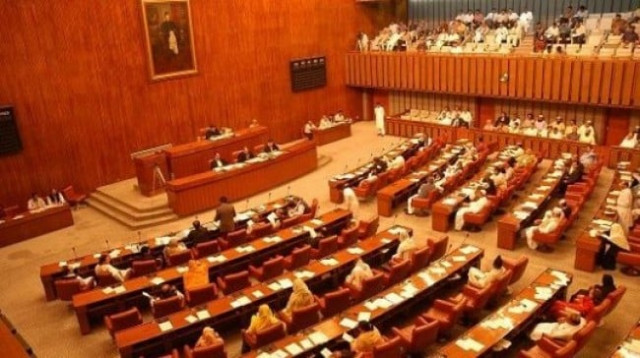Upper house proceedings: Govt wants assemblies dissolved simultaneously, says Badr
Says backdoor talks with ECP and chief ministers likely to bear fruit.

Senator Badr responded that after the 18th Constitutional Amendment, all provinces were free to make legislation and hold elections in their respective regions. PHOTO: FILE
The government is engaged in backdoor talks with provincial chief ministers and the election commission, apparently in a bid to dissolve all assemblies simultaneously so that elections may be held in a single day.
This was stated on Tuesday by Leader of the House in Senate Jahangir Badr, in response to a point of order raised by Senator Mohsin Leghari.
Leghari had said there was confusion and a constitutional deadlock pertaining to the dissolution of provincial assemblies at the same time, as their formation had been on different dates. Furthermore, governor’s rule in Balochistan had been imposed two months ago but had not been validated or revoked through a joint sitting of Parliament within 60 days, as is required by law.
“There is complete deadlock regarding the Balochistan assembly, as governor’s rule completed its 60 days today without it being legalized through a joint sitting of Parliament,” said Senator Leghari, adding that this particular provincial assembly had been formed on April 7. Therefore, it could not be dissolved without the consent of the provincial chief minister before this date.
It was in response to these remarks that Senator Badr said that backdoor negotiations were underway.
Regarding the constitutional impasse on the Balochistan assembly, Badr said he would consult the law ministry and inform the house of any developments on Wednesday (today).
Earlier, Senator Leghari also pointed out that local government elections had not been held in the past five years. According to him, democracy was incomplete without local body representatives.
Senator Badr responded that after the 18th Constitutional Amendment, all provinces were free to make legislation and hold elections in their respective regions.
ECP under fire
Through an adjournment motion, Pakistan Peoples Party Senator Saeed Ghani drew attention towards what he believed to be derogatory statements, made by members of the election commission, directed at parliamentarians.
According to him, the ECP had previously stated that any amendment in nomination papers could not be made without approval from the president. However, it changed its stance suddenly and issued another statement that declared it wielded unlimited powers to amend the papers, without the president’s approval, he added.
Furthermore, he said the members also issued statements to the media which clearly defamed parliamentarians. In fact, some election commission officials had even started a trend of writing letters to prominent editors.
In a similar vein, PPP’s minister Maula Bux Chandio said that in not getting approval from the president, the ECP was going beyond its constitutional limits. “We can also say that the oath we take, administered by the president, is also just a formality,” he said.
Chandio added that the commission was also violating the law by imposing a ban on development schemes and employment before the announcement of the election schedule.
However, Pakistan Muslim League-Nawaz Senator Jafar Iqbal jumped to the ECP’s rescue and said there was no harm if the commission made amendments to bar corrupt people from contesting elections.
Published in The Express Tribune, March 13th, 2013.



















COMMENTS
Comments are moderated and generally will be posted if they are on-topic and not abusive.
For more information, please see our Comments FAQ